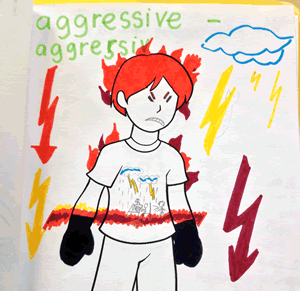


Stop the hitting! Mindfulness training with a middle school bully
The young mother is pregnant with her second child and is having a very difficult first trimester. Money is tight and her child’s father has moved to a foreign country. To be honest, she doesn’t have her son under control. Alexander was an 11 year old immigrant from Eastern Europe. He struck me as a young mix of Bill Gates and Vladimir Putin. Geeky, bright, and confident in a macho way. He only hit other kids, he explained in rudimentary English, because he felt he had to in response to their behavior. It wasn’t his fault. When they changed their behavior, the problems would end. On this day, we had called Alex’s mother into school to take him home. He was being suspended after throwing a Coke bottle at another child’s head. We were discussing the very real possibility of moving him to a special needs classroom. Experiments in mindfulness training I had introduced mindfulness training to my older pupils as part of a practical placement in a
3 1/2 year long program which qualified me as a ‘trainer of mindfulness and mindfulness
based communication methods.’ The training had provided me with a strong foundation for
my own mindfulness practice, but it had not trained me to work specifically with children. With my 14 year old pupils, I was doing about 5 to 10 minutes of practice a week oriented around the biology curriculum. Once a week, during study hall on their long Mondays, I offered a voluntary mindfulness training (MT) session. About half the class joined me each week just because they liked it. I was convinced that my “nice class” was becoming even nicer and more attentive. But Alex? He was a different story. His class didn’t have the language skills to do the “.b”
program yet - and I certainly didn’t have the time to work with him alone. My principal, who had supported my experiments with MT from the beginning of the year, asked if there wasn’t something I could do with Alex. I was at an impasse. Until I found Nirbhay Sing. Singh and his colleagues had successfully trained frazzled mothers to do a single practice with
their violent children each day – and their children’s violence had stopped.
One single practice? Ten minutes a day? And mom would do most of the work, not me? It
sounded too good to be true and, anyway, we had nothing to lose.
With support from my colleagues, I turned Singh’s “Meditation on the Soles of the Feet” into
the “Feelings to Feet” project for my first year English as a Second Language (ESL) pupils.
We called up Alexander’s mother once again – this time with an offer, not a complaint. Mom Alex’s mother agreed to practice MT herself for a month and then she would begin to do exercises at home with Alexander. We used material from the Mindfulness in Schools Project and from Singh. This was a good mother, and she was standing tall. I spoke to Alex alone. The whole class would do the training, I explained, but for him it could be a real opportunity. After emphasizing the fact that the other kids needed this, he grudgingly agreed to try, nothing more. Then we had non-judgmental lessons on feelings: calm, aggressive, curious, friendly, frightened. We talked about feeling strong, like a cool, non-reactive body guard. We drew pictures to answer the question, “What do you feel in your body?”
Closing scene: As I park my car in front of the school, a group of boys is looking in the
bushes. When I ask what they’re doing, Alex puts his hand on another boy’s shoulder and
says they’re helping him find his key. I feel hopeful – this young man is going to be a fine
leader one day. References .......................................................................... About the author
Christina Metz MEd, is a certified trainer for “Mindfulness and Mindfulness Based
.......................................................................... zurück ........... alle Artikel
|

 Then, in seven language lessons, the mindfulness mantra “nonjudgmental
Then, in seven language lessons, the mindfulness mantra “nonjudgmental